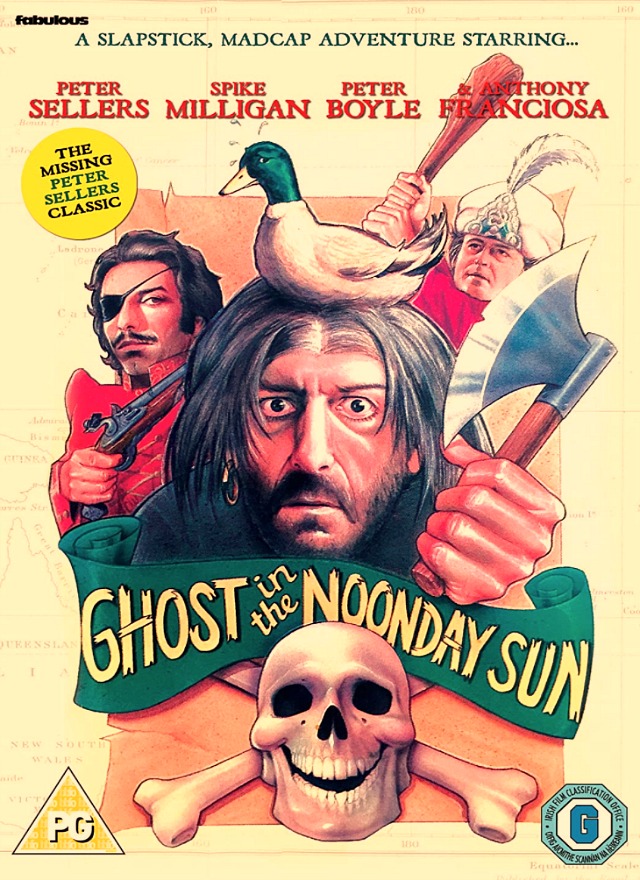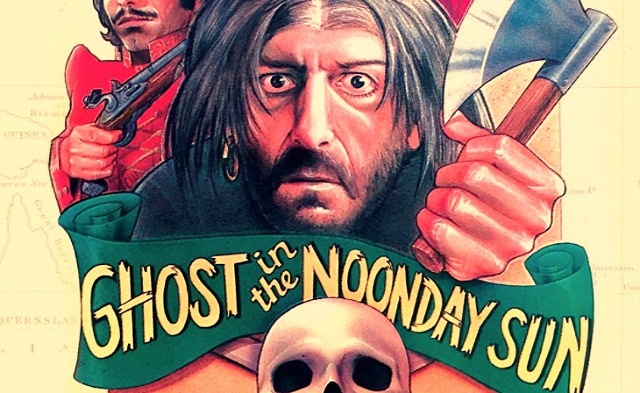Peter Medak‘s The Ghost of Peter Sellers (currently streaming) is a fascinating documentary about the disastrous making of his own Ghost in the Noonday Sun, a 1973 Peter Sellers pirate comedy that turned out so badly it was never released theatrically.
It was, however, issued on VHS in ’85, and on a Region 2 DVD in 2016 — $7.98 to buy, $3.99 to ship.
The 36 year-old Medak, coming off the success d’estime of The Ruling Class (’72), agreed to direct Noonday Sun in order to work with Sellers, regarded worldwide as a comic genius who was worth his weight in gold. If, that is, the script was first-rate and everything else was in its proper place.
Alas, the Noonday script was allegedly shoddy and shooting at sea (off the coast of Cyprus) was sure to be technically difficult. But the torpedo that destroyed the movie (and which damaged Medak’s career) was the erratic, instinctual madness of his lead actor, who could be extremely skittish and difficult to work with.

Sellers often said that he couldn’t abide mediocrity. Apparently he inhaled a good whiff of the stuff (or so he believed) almost immediately upon arriving in Cyprus. And so he tried to escape by bringing hell.
The best disaster docs of this kind are George Hickenlooper, Fax Bahr and Eleanor Coppola‘s Hearts of Darkness (’91), Keith Fulton and Louis Pepe‘s Lost in La Mancha (’02), about the calamitous undoing of Terry Gilliam’s first attempt to make The Man Who Killed Don Quixote, and Les Blank‘s Burden of Dreams (’82), about the arduous making of Werner Herzog‘s Fitzcarraldo (also ’82).
The Ghost of Peter Sellers is just as good and as necessary as these three. You really do have to watch it.
I was going to write about Medak’s film earlier this week, but I was depressed about being late to the party. I could have seen it at the 2018 Telluride Film Festival but I didn’t. I could have obtained a press screener earlier than I did. Bummed, man. Couldn’t get it up. I finally got going today.
A week-old discussion with a colleague:
HE: “Sellers was obviously the lunatic villain in this bizarre saga. Yes, they shouldn’t have made the damn film. Yes, it was a bad idea with a script that allegedly blew chunks. The only thing that was ready was the money. But Sellers was a crazy man.”
Colleague: “Sellers was crazy at times, but I honestly don’t think it was his behavior that ruined the film. And if that’s the case, why is he the villain?”
HE: “A producer says in the doc, ‘We all knew Peter was crazy, but we didn’t know how crazy.’
“Sellers was miserable during the shoot, but he was the powerhouse. He knew the difference between a good script and a bad or weak one. He wanted to have fun and do The Goon Show with Spike Milligan. But he had to know that the whole thing had a basic dubiousness and fragility.
“Yes, Medak saw that also, but he trusted in Sellers’ genius. Which was absurd, of course — if it’s not on the page it isn’t worth doing. Sellers played the innocent when he met Medak later on. ‘It was you and me vs. them,’ he recalled. Medak replied, ‘No, Peter. It was you.’
“It must have been miserable for Medak to have begun his career on three high notes (especially the acclaim given to The Ruling Class) only to crash into the hellish Sellers catastrophe in Cyprus, He never tasted that Ruling Class hoo-hah again. He never got the pick of the best scripts again. He kept going and had a productive life and career, but he never again got to play and sing with the gods.
“But you know what? At least this miserable shoot produced a fascinating documentary, 45 years after the fact. So something of value finally came of it.
Colleague: “Medak [isn’t a great] filmmaker — even The Ruling Class doesn’t hold up. And Ghost in the Noonday Sun was set up, with Medak’s cooperation, to be a trippy-surreal early-‘70s piece of bombastic whimsy. If Sellers had behaved on the set, would the film have been better? No one can say for sure, but I lean toward saying no, and, in fact, I don’t really see HOW it could have been better. It was unwatchable nonsense from the get-go.
“Yes, Sellers did take what was already a difficult shoot and turn it into something uniquely hellish. There’s no question that he was a diva with borderline personality disorder.
“Medak’s basic stance throughout the documentary is defensive. After 45 years, he’s still saying ‘Who’s to blame?’ It would be fascinating if we could somehow get Sellers’ true take on it…
HE: I agree that Medak wasn’t a genius-level or even exceptional-level director. He was/is a good-enøugh, sometimes-better-than-good-enough director. That means he’s among the…what, 80% or 85% of directors working in this industry who are able enough and have certain gifts and abilities (including the necessary political skills) but who are not, at the end of the day, on the level of Wilder or Ford or Kubrick or Fincher or Nolan.
“Medak has nonetheless assembled one of the finest ‘making of a disaster’ docs. Completely immersive, and far more noteworthy that the original 1973 comedy.”

